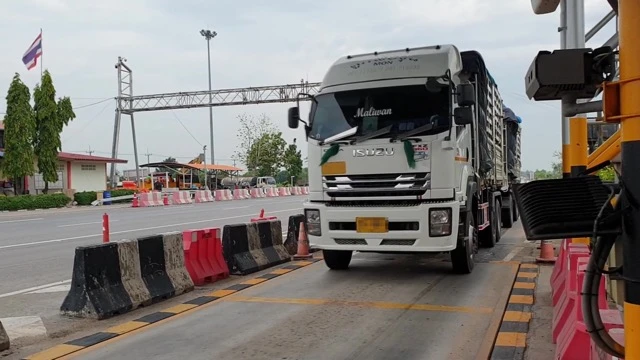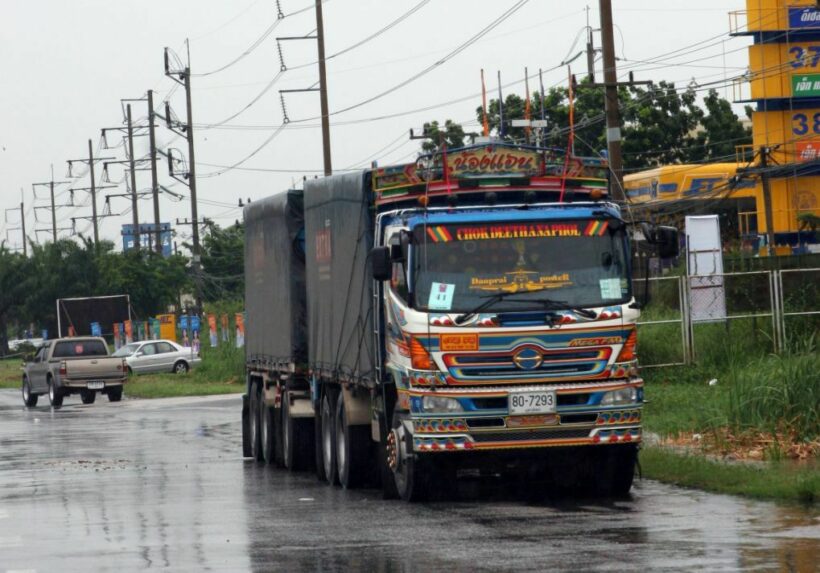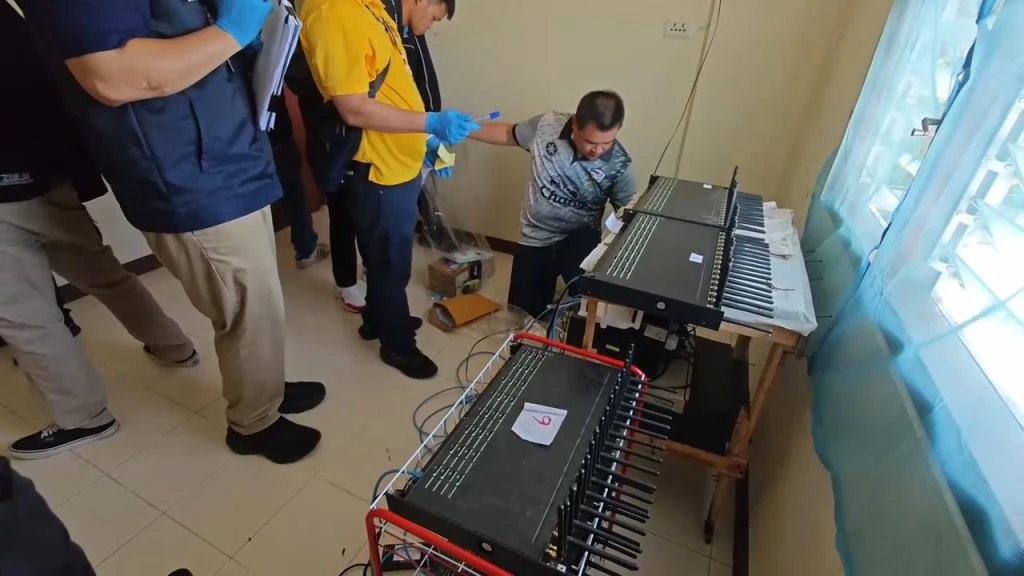Crime
12 Highway Police Officers Face Criminal Charges Over Bribery Scam

As Thailand’s anti-graft commission expands its inquiry into the overloaded truck bribe-sticker incident, 39 highway police officers have been transferred to inactive posts while the investigation continues.
One deputy superintendent, 17 deputy inspectors, and 22 non-commissioned officers have been transferred. According to Pol Maj Gen Jaroonkiat Pankaew, commander of the Counter Corruption Division (CCD), 12 will face criminal charges for accepting payments.
They will be assigned to the Highway Police Division operations centre pending further action, according to Pol Maj Gen Jaroonkiat, who has also been acting as the division’s boss since its leader was transferred to an inactive post.
He stated that he anticipated more officers and officials with higher grades would be engaged, but that they may be from different agencies. He stated that the probe will be extended by a working panel of the National Anti-Corruption Commission (NACC).
Wiroj Lakkhanaadisorn, a Move Forward party list MP-elect, exposed the scandal, which was alleged to have been going on for at least 20 years. According to the outspoken legislator, overweight vehicles with special stickers are never detained, and their drivers are never arrested.

On May 30, Pol Maj Gen Ekkaraj Limsangkat, commander of the Highway Police Division, was reassigned to an inactive position at the Central Investigation Bureau following the initial reports.
On Friday, a senior Ministry of Transport official confirmed that the mechanism for controlling overweight trucks had flaws.
According to Pisak Jitviriyavasin, the ministry’s deputy permanent secretary, the human component — especially, the use of discretion in selecting which trucks to hold and which to release — needed to be addressed.
He stated that the ministry would prioritise IT solutions in order to limit human discretion and graft as much as feasible. A body camera system should be implemented in the long run, he said after chairing a meeting of a ministry fact-finding commission on the bribery scandal.
He has directed the Departments of Highways and Rural Rods to investigate the usage of body cameras by officers and intends to bring the topic up for consideration at the next meeting on June 20.
The Department of Highways has 97 permanent weighing stations, whereas the Department of Rural Roads has five.
Mr Pisak stated that the ministry would take disciplinary measures against personnel discovered to have taken payments from operators of overloaded lorries.

According to Jirapong Theppitak, deputy director-general of the Department of Highways, the department has established two working panels. One will investigate any malfeasance by officials, while the other would examine weighing stations to improve efficiency.
He stated that the Land Transport Federation of Thailand would be invited to provide information to the department about alleged bribery involving department officials.
Meanwhile, a police station chief and a deputy provincial commander in Phichit will be charged with bribery in the amount of 176 million baht.
According to Deputy person Police Chief Pol Gen Surachate Hakparn, the money was placed in a bank account owned by a Myanmar person who died years ago.
The pair were discovered to have assisted a Chinese national in gaining access to a bank account that had been frozen for a long period. According to Pol Gen Surachate, it was linked to a cocaine smuggling gang.
The incident was discovered after a bank officer informed Thong Lor police of the Chinese national’s effort to obtain a new bank passbook for the account. He claimed to be the account owner and stated that his old passbook had been misplaced.
According to him, this resulted in the arrest of seven people, including a well-known gynaecologist, on allegations of stealing and using a forged stamp.

According to Pol Gen Surachate, who cited a confession supplied by the Chinese suspect, investigators discovered the Chinese citizen was supported by the Phichit police station chief and the deputy provincial police chief in deleting the account from a list of assets frozen by the police.
The Chinese guy also told detectives that two police officers sought a bribe in exchange for assisting him, according to Pol Gen Surachate, who added that further details could not be disclosed at this time.
“The investigation will be completed next week, and charges will be filed against the two officers,” he stated.
The Samut Prakan police commander, who was found to have ordered a team under his supervision to seize more than 900 bank accounts owned by criminal suspects in various cases, has been transferred to an inactive position at the Royal Thai Police Sports Club while he faces a formal investigation, he said.
“The investigators in charge of this case are gathering evidence to investigate the alleged embezzlement, and it will take them a week or two to complete the investigation,” he said.
According to Pol Gen Surachate, the Samut Prakan police commander has a history of red warnings given by the Provincial Police Region 1 commissioner for his alleged involvement in similar embezzlement crimes.
Police Corruption in Thailand
Police corruption in Thailand has been a long-standing issue that has garnered attention both within the country and internationally. While it is important to note that not all police officers in Thailand are corrupt, there have been numerous instances of corruption within the police force. Some common forms of police corruption in Thailand include bribery, extortion, collusion with criminal networks, abuse of power, and involvement in organized crime.
Bribery is one of the most prevalent forms of police corruption in Thailand. Officers may demand bribes from individuals to ignore or lessen the severity of offenses, avoid legal consequences, or expedite bureaucratic processes. This can range from minor traffic violations to more serious crimes.
Extortion is another form of corruption where police officers abuse their power to extract money or favors from individuals. They may threaten legal action or create false charges unless the victims comply with their demands. This form of corruption is particularly detrimental to the public’s trust in law enforcement.

Collusion between police officers and criminal networks is another significant concern. Some officers may work in partnership with organized crime groups, providing protection, information, or turning a blind eye to their illicit activities in exchange for financial gain. This collusion undermines efforts to combat crime effectively.
Abuse of power by police officers is another manifestation of corruption. This includes using excessive force, engaging in extrajudicial killings, and violating human rights. Such abuses erode public trust and confidence in the police force.
Efforts to combat police corruption in Thailand have been ongoing for many years. The government has implemented various measures, including stricter regulations, anti-corruption campaigns, and internal disciplinary actions. However, eliminating corruption entirely is a complex task that requires systemic changes, improved transparency, and a strong commitment from all levels of law enforcement.
International organizations and civil society groups have also been involved in addressing police corruption in Thailand. They provide support, monitor the situation, and advocate for reforms to promote accountability and integrity within the police force.
It is worth noting that the information provided here is based on the knowledge available up until September 2021, and the situation may have evolved since then.

Crime
Police Officer Being Ordained at Temple Arrested for Running Scam Call Center

Police in Northern Thailand have arrested a fellow officer as he was being ordained at a temple in Ngao district of neighbouring Lampang province.
Pol Lt Col Bandit Khonkan chief inspector from the Hang Dong police station was disrobed and taken to the Chang Puak station in Chiang Mai. He was arrested on charges of running a call centre scam gang in Chiang Mai Province.
According to Thai Media Chiang Mai Provincial Police Region 5 obtained an arrest warrant for Pol Lt Col Bandit on Friday from the Chiang Mai Provincial Court for procuring illegal telecom equipment, setting up a station and using public airwaves to run a telecommunications business without permission.
Pol Lt Col Bandit reportedly told investigators that he was not the ringleader and was only a member of the gang with Chinese partners.
His arrest followed the apprehension of his 26-year-old daughter, Miss Wanuchapond, 26, and three others during raids at three housing projects in Chiang Mai on Friday, Pol Maj Gen Weerachon Boontawee, deputy chief of Provincial Police Region 5 told Thai media.
During the raids police police discovered around 12 GSM gateways, or SIM boxes, which are devices used for converting cellular networks into mobile phone numbers used domestically.
The chief inspectors daughter Miss Wanuchapond told the arresting officers that she was paid 8,000 baht a month at each of the three locations for renting thr rooms and monitoring devices.

She claimed she had no idea what the devices were and accepted the job because the pay was attractive.
Police investigators working with telecom regulators used a special tracking device to monitor the gang’s communications and learned that its base was in Myanmar opposite Mae Sai district of Chiang Rai.
The call center gang used the GSM gateways to make calls over the internet to scam people in Thailand out of million of baht.
The GSM gateways transmitting signals via SIM boxes to convert them into domestic phone numbers, duping victims into thinking they were being called from Thai government agencies.
Pol Maj Gen Weerachon said that each SIM box held 32 SIM cards, with a capacity of up to 300,000 calls a month. The seized devices had made fraudulent calls over 3.6 million times.
He said the their investigation is ongoing and they are working to track down the remaining conspirators, including Chinese and other Thai suspects.
Authorities are still deciding whether Pol Lt Col Bandit will be dismissed from the force, he said, adding that so far, no other officers are known to have been involved.

Meanwhile, Prime Minister Settha Thavisin has authorized the establishment of an emergency cyber center operated by the Royal Thai Police to combat transnational crimes committed by call center gangs along the Thai border in Chiang Rai province.
On July 19, Prime Minister Settha Thavisin directed the Center to combat information technology crimes. The Royal Thai Police (Royal Thai Police) will crack down on call center gangs in Myanmar, Laos, and along the border.
His directive comes as call center gangs ratchet up their scams to defraud people of their money, causing concern among Thais and jeopardizing the country’s economic and social stability.
Related Police News:
Machete Wielding Man Shot an Killed by Police in Chiang Rai
https://www.chiangraitimes.com/chiangrai-news/machete-wielding-man-shot-an-killed-by-police-in-chiang-rai/
Crime
Thai Immigration Police Arrest Colombian Tourists Over Home Invasions

Immigration police officers have arrested four Colombian nationals in connection with a series of home burglaries at luxury housing complexes in the Bangkok metropolitan area and Chiang Buri Province.
Pol Maj Gen Panthana Nuchanart, deputy commissioner of the Immigration Bureau, told a press briefing that three of the suspects were apprehended in Nonthaburi Province and the fourth in South Pattaya, Chon Buri Province.
According to the Bangkok Post, the Colombians were charged with stealing conspiracy and seized around 3 million baht (US$82,500.00).
According to Pol Maj Gen Panthana, the criminals rode motorcycles through housing estates, scoping out the properties and waiting for the owners to depart before committing their crimes.
He stated that all four of the accused denied any involvement in the home break-ins, but the arresting squad discovered evidence that implicated them.
Police called to home invasion
Meanwhile, police were dispatched to a luxury housing development in Tambon Nong Prue, Chonburi Province, after a Chinese man was attacked during a house invasion.
When they arrived, they discovered the house owner, Mr. Qian Peng Yi, visibly scared and with marks from being tied up with a cable. He informed police that three Chinese males broke into his home at 9 p.m., one of whom brandished a gun at him and directed him to his bedroom.
They bound his hands and feet, gagged him with fabric, taped his head, and forced him into the bed. The intruders then attempted to compel him into transferring 10 million baht in cryptocurrencies to them, endangering the life of his 33-year-old cousin who was in a second-floor bedroom.
While they scoured the house in search of riches, Mr. Peng Yi managed to flee and hide; he subsequently observed them leave with his cousin. Officials investigated the property and analyzed security camera footage from the incident and surrounding areas.
Around 9 p.m., a 30-year-old van driver came at the Bang Lamung police station after being contacted by an agency to carry Chinese customers from Pattaya to Suvarnabhumi Airport.
The driver informed authorities that he was supposed to pick them up at a motel about a kilometer from the Chinese businessman’s home. He then drove them to Bangkok’s Suvarnabhumi airport, arriving at 1 a.m. and receiving 1,800 baht.
The driver took a snapshot of the group smoking at the airport gate and identified one of them as the victim’s cousin. Police suspected coordination between her and the three suspects in her cousin’s heist, who all departed Thailand on the same aircraft.
Other Bangkok News:
Police in Bangkok Discover Six Vietnamese Tourists Dead in 5 Star Hotel
Police in Bangkok Discover Six Vietnamese Tourists Dead in 5 Star Hotel
Crime
Son of Thailand’s Leading Legal Scholar on Corruption Arrested for Running Online Gambling Network

The son of a former senator and leading economist and expert on corruption and gambling in Thailand has been arrested for on charges of running an online gambling network and its payment system.
Police from Thailand’s Technology Crime Suppression Division (TCSD) have confiscated assets worth more than (US$ 11.1 million) 400 million baht.
Narote Piriyarangsan, 33, was arrested following crackdowns in three sites around the city, according to Pol Maj Gen Athip Pongsiwapai, commander of the police Technology Crime Suppression Division (TCSD).
Mr Narote’s father, Sangsit Piriyarangsan, is an economist who has written articles and books about corruption and gambling. He was one of the appointed senators that were investigating the government’s intention to legalize casino gaming before their terms expired.
Police also detained 39-year-old Narayut Narakaew, the owner of the gambling website 69pgslot.com. The Criminal Court issued arrest warrants for the couple for operating an internet gambling service and money laundering.
According to the Bangkok Post, police seized two desktop computers, one laptop computer, 14 mobile phones, 21 bank passbooks, 53 ATM cards, and four high-end cars — a Ferrari 926 GTS, an Aston Martin, a Lexus, and a Subaru — totaling more than 400 million baht.
Police launched the inquiry after discovering the online gambling site, which accepted funds via an automatic deposit-withdrawal system through bank accounts and deposits in the AskMePay system. Players scanned the VPay QR code as well as the QR codes for Heng Online 888 or Heng Pay Company.
Police also discovered that payments received via QR code scans were transferred to the account of Heng Pay Co and then to the gambling website’s mule accounts using AskMePay, which did not use banks’ face recognition scanning. An inquiry indicated a monthly turnover of approximately 5 billion baht.
According to investigators, the website has been up and running for around four years, with the payment mechanism in use for roughly eight months.
According to Pol Maj Gen Athip, Mr Narote owns the gaming website’s payment systems and is the director of Heng Pay Co. After gathering evidence, authorities requested arrest warrants for 14 people.
Thailand does not allow almost any kind of gaming. Even though the law doesn’t say anything specific about online gaming, it is still considered gambling. The country has pretty strict rules about gambling. Thai punters can bet on the national lottery and horse races, but they can’t bet on any other types of games.
But it’s not a secret that there is a huge illegal gaming business in Thailand, even though it’s illegal.
The illegal casinos, online betting shops, underground lotteries, and pop-up bookies that take bets on everything from cockfights to Muay Thai make a shadow economy that is worth billions of dollars every year.
Related News:
Thailand’s Cyber Crime Police Raid Top Cops Home Over Gambling Websites
Thailand’s Cyber Crime Police Raid Top Cops Home Over Gambling Websites
-

 News3 years ago
News3 years agoLet’s Know About Ultra High Net Worth Individual
-
Entertainment2 years ago
Mabelle Prior: The Voice of Hope, Resilience, and Diversity Inspiring Generations
-

 Health4 years ago
Health4 years agoHow Much Ivermectin Should You Take?
-

 Tech2 years ago
Tech2 years agoTop Forex Brokers of 2023: Reviews and Analysis for Successful Trading
-

 Lifestyles3 years ago
Lifestyles3 years agoAries Soulmate Signs
-

 Movies2 years ago
Movies2 years agoWhat Should I Do If Disney Plus Keeps Logging Me Out of TV?
-

 Health3 years ago
Health3 years agoCan I Buy Ivermectin Without A Prescription in the USA?
-

 Learning3 years ago
Learning3 years agoVirtual Numbers: What Are They For?